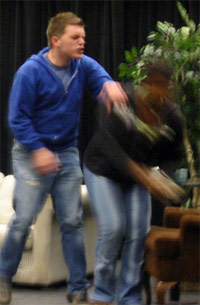What is interactive theater?

Students act out scenes of discrimination or oppression
The Illumination Project performances are based on a style of theater known as Theater of the Oppressed, which was developed by Brazilian theater activist, Augusto Boal. Theater of the Oppressed is a non-traditional theater style used to promote community-centered problem solving.
During performances, Student Educators perform a student-written short play (10 to 20 minutes long), which presents a problem of discrimination or oppression. They perform the play once through without interruption and without solving the problem. Then the students start the play again. This time the audience members can say “stop” when they see oppression happening. At that point, the audience member comes up on stage and takes the place of one of the characters who they believe could create a positive solution to the problem presented. This is called an “intervention.”
The Student Educators work with the audience member with whatever tactic they try. Sometimes an intervention the audience member attempts “succeeds,” and sometimes it does not. Either way, it is an active learning experience for actors and audience members. When the audience member is finished with their intervention, the facilitator debriefs with the audience member, the actors, and the rest of the audience, and then the play continues to the next “intervenable” scene.
 Even audience members who do not actually come up on stage actively rehearse in their minds what they would do in the situations portrayed in the plays. In this way, the Illumination Project challenges the viewpoints of both the audience and the Student Educators. In a realistic yet safe atmosphere actors and audience members have the opportunity to rehearse situations in order to build communication skills and understand their alternatives.
Even audience members who do not actually come up on stage actively rehearse in their minds what they would do in the situations portrayed in the plays. In this way, the Illumination Project challenges the viewpoints of both the audience and the Student Educators. In a realistic yet safe atmosphere actors and audience members have the opportunity to rehearse situations in order to build communication skills and understand their alternatives.
The Illumination Project also enables audience members to take on different characters in order to build empathy – a key element to living respectfully in a pluralistic society.
